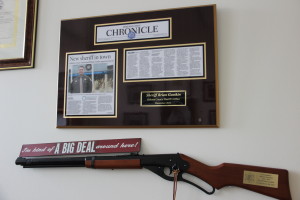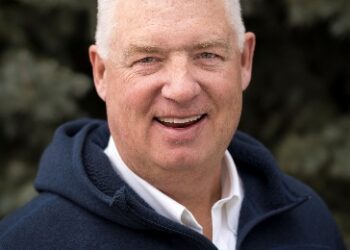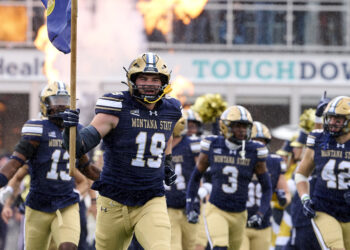By Joseph T. O’Connor Explore Big Sky Managing Editor
A shorter version of this interview, edited for brevity, appeared in the May 1 issue of the Explore Big Sky newspaper. The following is the complete interview.
Two investigations in Big Sky are currently underway, as of EBS press time on April 29, stemming from incidents in the past month: one, an alleged heroin overdose causing the death of a 25-year-old male; the other, a vehicle-related incident resulting in the death of a 28-year-old woman.
Questions have been swirling around this small community of approximately 2,500 residents. With a surging economy, Big Sky is seeing unprecedented growth in terms of year-round residents and seasonal employees.
Enter Brian Gootkin, Gallatin County Sheriff and former detective with the Missouri River Drug Task Force. Gootkin, 45, grew up in Wallingford, Conn. and entered the U.S. Air Force in 1989 before being stationed in Great Falls in 1990. He never left Montana.
Gootkin has served in every post with the Gallatin County Sheriff’s Office since he was hired in 1993 – including as the Big Sky/West Yellowstone sergeant – and has been sheriff now for three years. He lives in Bozeman and has a daughter, Alicia, at Montana State University, and a son, Tyler, who is a senior at Three Forks High School.
Explore Big Sky sat down with Sheriff Gootkin to find out whether these latest incidents are signs of things to come, or facts that any community – large or small – faces on a regular basis.
Explore Big Sky: Have you noticed an increase in crime in Big Sky since you started in 1993?
Brian Gootkin: It goes in waves. This is the third wave I’ve actually seen as far as growth. I was stationed [in Big Sky] as the sergeant during the Y2K boom and left right at the end when it was tanking. That was the first boom for the Yellowstone Club and some of the other closed-gate communities. So I’ve seen it all, but I’ve also seen where it goes like this [in waves].
Right now we have some high-profile, bad situations going on, but most of the things we deal with are your basic thefts, disorderly conducts. We have the employees that only live [in Big Sky] seasonally, and then we have the traffic and construction. So you’ve got those two dynamics.
EBS: So you directly relate any crime increase or decrease to the current population numbers?
BG: It’s numbers. If you have more people, you have a chance of having more situations.
EBS: Do you notice these trends in Big Sky or Bozeman or Gallatin County in general?
BG: Gallatin County in general. But Big Sky is unique, and West Yellowstone: When things are slow it’s a different world because it’s so small and so compact. In the Valley – we call [the Bozeman/Belgrade area] the Valley; we call [everything south on 191] the Canyon. In the Valley, it’s almost never slow. There is no offseason down here.
There’s eight total resident deputies that cover the Canyon 24-7, 365 – I used to be one of them. You have two in West Yellowstone and six in Big Sky.
EBS: Do they live in Big Sky?
BG: Yes, the six do. They have an office right in the [Big Sky] fire department.
EBS: So how many are on shift at one time in Big Sky?
BG: If you’re lucky, two. Most of the time, one. When you’re talking six [deputies] for 24-7, 365 coverage, there are gaps.
EBS: How long are those gaps?
BG: Hours, it just depends. Usually, it’s after the witching hour so it’s that dead area in the early morning. We want to make sure, especially on weekends, that we have [deputies] out and about during that time period where nothing good happens – after midnight and before 3 a.m.
EBS: What steps is your office taking to prevent crime-related incidents?
BG: Presence is one of the most important things you can do. Our guys have take-home vehicles so a lot of times it looks as though there may be more of us than there actually are because you see vehicles. It’s the number one thing we can do is be around and be available and be visible. One of the other things is we have a great relationship with both the Yellowstone Club and Boyne. Anytime they see a [crime-related incident], they trust us. We have a great working relationship with those folks.
It’s the number one thing we can do is be around and be available and be visible. One of the other things is we have a great relationship with both the Yellowstone Club and Boyne. Anytime they see a [crime-related incident], they trust us. We have a great working relationship with those folks.
EBS: How many deputies serve Gallatin County?
BG: All together we have 53 sworn for our entire office. And our county – just to give an idea geographically – it’s twice the size of Rhode Island and we cover it with 53.
EBS: Is that enough?
BG: No. When I was [working the Canyon] in the late 90s, early 2000s, there were only four of us covering West and Big Sky. So we have worked closely with Gallatin and Madison counties and the Resort Tax [Board] to double that.
EBS: How many would it take to effectively cover the area?
BG: We have hired the National Sheriffs’ Association to do a staffing analysis. Right now Big Sky and West Yellowstone are different, but in the Valley it’s a whole different dynamic. We have the courts, we have transports, we do all of that. Right now our patrol deputies in the Valley are doing everything but patrol. When you ask what we’re doing to be proactive down here, we’re not doing anything. We’re just reactive.
EBS: Explain the contractual agreement you have with the Big Sky area.
BG: We have contracts with both the Resort Tax Board for two deputies, Madison County for two deputies, and Gallatin County, so it’s split equally – two, two and two – for the finances. We cover the Yellowstone Club, Boyne, and Moonlight, which are in Madison County. We have a great relationship with the Madison County Sheriff’s Office. It’s unique; it’s the only one in the state of Montana that’s like that – where one county contracts with another to cover their geographic area.
EBS: Is there an ideal number of deputies in Big Sky?
BG: In Big Sky, I think we’re OK right now. We pay all six deputies a living allowance of $900 a month, because it costs more to live there. That’s an incentive to get and keep people up there. I would argue that they’re doing better [in Big Sky] than we’re doing down here [in Bozeman.]
EBS: Tell me about your role and responsibility to Big Sky as sheriff.
BG: Big Sky is unincorporated, so we are pretty much the police department up there. As the sheriff, I work closely with the Forest Service, with the fire chief, with the big businesses like Boyne and Yellowstone Club. My role as sheriff, I’ll be up there next month for the resort tax meeting. I’m the politician, I’m the elected official, so if they have concerns about the way we’re doing things up there, when push comes to shove, the buck stops with me. I need to do what I need to do to make sure people are safe.
Gallatin County being one of the biggest jurisdictions in the state, I feel as though my role as the sheriff is not just to sit behind this desk but to be out, so I’m on the road or I’m out in the community a lot.
EBS: What about funding? I know in the past you’ve requested resort tax funding for another deputy.
BG: Just two years ago, the resort tax [board] added a deputy. Our agreement with that was we’d have a deputy in Ophir School and then because of the [population] growth, you have a lot of thefts a lot of burglaries. That requires follow-up…
EBS: I’d like to ask you about the latest incident in Big Sky. Kerri McKinney was a 28-year-old Yellowstone Club employee struck by a vehicle April 13 and later died from trauma-related injuries. An affidavit was filed with the Gallatin County clerk of the District Court on April 20 and indicates that investigators obtained a search warrant for a green 2004 Toyota Tundra registered to one David Hughes. The affidavit puts Hughes at the crime scene. Have there been any arrests or charges filed?
BG: Not yet.
EBS: Why not?
BG: The investigation is ongoing. And that is a joint investigation between us and the highway patrol.
EBS: Explain to readers what you can say when an investigation is ongoing. What are you required to keep quiet?
BG: Anything that is public knowledge, I can say that exact thing, just like you said from the probable cause affidavit. I can’t answer questions about that because it’s not pubic record, and that’s state law. So I actually would violate state law by giving you my opinion or other information other than what’s public record on the investigation.
It is incredibly frustrating for law enforcement because I hear and see the comments. There was something on Facebook the other day saying, ‘Why aren’t the Big Sky cops doing anything?’ Well, we are. We absolutely are, but you can’t know that. You can’t know what we’re doing, by law. But people can write and say anything they want and because we are out of sight, out of mind, [people often think] we’re not doing anything, which is absolutely not the case.
EBS: Is this a particularly lengthy investigation?
BG: No. Unfortunately though, with everything else that’s going on, because of the size of our office, we have to prioritize. So when you have a number of major investigations going on at the same time, you only have so many people and you can only do so much. Our job is to prioritize and say, ‘This is what we’re working on today.’
It may mean that we’re waiting on information from the highway patrol, or waiting for information from the autopsy from the Montana State crime lab. So many different things, so many different dynamics. But these investigations don’t happen like that (snaps fingers).
EBS: What people see is what information is available to the public. He was at the scene of the crime, why isn’t he arrested? He said he was driving the vehicle. Do you know where David Hughes is?
BG: I don’t, no. I imagine that our investigators do.
EBS: Has he been brought in for any further questioning?
BG: I don’t know. We’ve been so busy with that [Madison Veele] search. We have a lieutenant that’s in charge of our detective division and we have four detectives, so we have five people that are responsible for all of our felony investigations throughout the county. I think the police department has just as many if not more just for their jurisdiction within the city.
EBS: Talk about the municipal jurisdiction for the police department versus the sheriff’s office.
BG: The City of Bozeman Police Department has 65 sworn [officers] compared to our 53 [deputies]. So they have 12 more sworn to cover just the city of Bozeman. They don’t run a jail, they don’t do search and rescue, they don’t do civil process.
EBS: What do you want to tell readers who want to know what’s taking this investigation so long?
BG: I learned really quick when I became sheriff three years ago – I started reading the blogs, and I immediately stopped because what I realized was a lot of the people that write in those are the same people, and they seem unhappy. No matter what I say, it makes no difference to that very small group of people. So I’m not going to focus my energy and my resources on trying to change them.
What I would say to the general public is, just because you don’t see or hear us, I will tell you that that absolutely is the opposite of what we’re doing. We just by law can’t talk about ongoing investigations. We do really, really well with what we have. A day will come when we need to get caught up and we’re way behind on people and we’re way behind on technology. The [Gallatin County] commissioners have been very supportive as far as using some of those jail revenues to get us caught up on equipment, vehicles and that type of stuff. I’m hoping the next step will be technology like our records management system.
The [Gallatin County] commissioners have been very supportive as far as using some of those jail revenues to get us caught up on equipment, vehicles and that type of stuff. I’m hoping the next step will be technology like our records management system.
But the one great thing that we do have is people. We have great people, and that’s the core. Everything else you can buy and you can fix and you can learn and you can train, but if you don’t have a good core of good people that are doing this for the right reasons, which we do, then all that other stuff doesn’t matter. That’s what you’re seeing in some other jurisdictions around the country that’s giving everyone a black eye. I guarantee they have way more equipment and technology than we do; they don’t have the culture we have. And that’s Montana too.
EBS: Is there a timeline for this investigation?
BG: We want to get it done as soon as everyone else wants to get it done, so there’s no timeline. I would imagine next week [of April 27] we should be moving on it regardless. It just depends on all the things we’re waiting on.
EBS: Can you walk me through the steps of a typical investigation?
BG: You have your initial response, which is usually patrol. In this particular case, not only did our deputy sheriffs respond, but also the highway patrol, so you have two jurisdictions that are working together. Then there’s all of the follow-up. You’ve got the search warrants, you’ve got the crime scene – if we believe there was a crime – you have the coroner’s office, and that’s a whole separate investigation. You start following up with interviews with family, friends, and then there’s the crime lab portion.
Part of this [McKinney case] was also the vehicle investigation and that’s when the highway patrol brought their team in. There’s a lot of moving parts and there’s a lot of follow up and you don’t just have 20 people like you see on CSI where they just cordon everything off and next thing you know it’s done in a day. That is not real life.
And once you do these interviews or get this follow-up information, that may lead to more interviews and more follow up, and many [times] that’s the case.
EBS: Do you ever hold people on probable cause?
BG: Sure.
EBS: Why wouldn’t you in this case?
BG: Because of the circumstances, which I can’t talk about. There are certain crimes that are different than others. For instance on this [case], you have two people involved in a vehicle and these people are intimately together. That’s different than, for instance, an armed robbery at a pharmacy in Big Sky… This person who [commits] that armed robbery, we’re going to arrest them and take them into custody because they are a threat to public safety.
In a partner-family member assault where you have somebody that hurts another member of the family: obviously that’s a threat, but it’s not a random threat. So somebody that comes in and robs the Exxon in Big Sky, that’s a random act where they’re putting everyone in jeopardy. This particular that we’re investigating was a specific incident where certain people were involved. That’s the difference in this [McKinney] case.
EBS: Has the Gallatin County Sheriff’s Office responded to any calls relating to domestic violence regarding Hughes and McKinney in the past?
BG: I have not been made aware of anything like that.
EBS: What other calls have you been responding to lately in Big Sky? Are you noticing any trends?
BG: I would have to refer you to Brandon Kelly, the sergeant up there.

EBS: There’s a perceived underbelly associated with resort towns. Is there a culture of illegal drug use in Big Sky?
BG: I would say not any more than anywhere else. When I was up there in 2000, it was pretty rampant and it was pretty open. When they had the upper and lower dorms in the Mountain Lodge, which was right next to the Black Bear [Bar and Grill]. They no longer exist, but back then, when I first became sergeant in Big Sky, it was blatant. And we worked collectively to have a presence up there and be proactive, and that made a huge difference. I really don’t think it’s that way anymore. Boyne was a huge part of that as well, [by] hiring more security officers, because they don’t want that either. [Big Sky Resort] is supposed to be a family area where you can feel comfortable, and if you’re walking around and people are acting like knuckleheads, they don’t want that. It’s been a really good partnership.
EBS: You feel drug use has decreased since 2000.
BG: I don’t know if the use has decreased, [but] the overall blatant openness of it has decreased.
EBS: Any particular drug types you guys are seeing in Big Sky?
BG: Obviously marijuana is the number one, and it always has been. Back in the day when I would walk those halls at the Mountain Lodge, there would be guys with their doors wide open or even out on their decks just lighting up the bongs. They saw me walking up and were like, ‘What are you doing here?’ [I’d say] ‘Well, there’s a new sheriff in town.’ Pretty soon, next thing you know the doors are closed… and they’re behaving themselves and being cool.
EBS: It’s about having that presence?
BG: And being fair. Fair, firm and consistent. Letting people know that we’re not just there to mess with them, but there are certain things that are acceptable and certain things that aren’t. Once you lay those rules down … there’s a mutual respect.
EBS: Tell me about the drug overdose incident near Big Sky’s West Fork Mall in March.
BG: We’re still investigating it. And that is very disturbing. So we’re not done with that yet.
EBS: It’s public knowledge from a press release sent out by your office that it involved a 25-year-old who overdosed on heroin. Are there other incidents like this? People in small towns don’t usually think, ‘heroin.’
BG: I will tell you that [heroin] is one of the drugs that is on the upswing, unfortunately.
EBS: Is that a Montana thing, or a Gallatin County thing?
BG: It’s a Montana and a North Dakota thing. I know for a fact that it’s got to do somewhat with the Bakken [oil fields]. You’ve got the [methamphetamine] and then now all of a sudden you’ve got the heroin as well. It’s just part of that culture.
EBS: Why suddenly heroin? It seems to have nationwide presence. Does it have anything to do with a crackdown on prescription opioid pills like oxycodone?
BG: I used to be a drug cop before I went to Big Sky and the usage, selling and availability [fluctuates with population]. Then you have things like this that happened in Big Sky where [a person overdosed], and it’s so addictive. You have a few of those types of incidents and the next thing you know, usage goes down. Or you have a few big busts and it goes away.
EBS: Have there been any arrests in this Big Sky overdose case?
BG: No.
EBS: Has anyone turned themselves in?
BG: No.
EBS: How is Big Sky different from other Montana towns in terms of crime?
BG: Because of the demographics. So you have people with a lot and you have people with a little, and there are very few people in between. Many of the people up there [in Big Sky] don’t even live there. Many of them [commute] from Bozeman, Belgrade or [Gallatin] Gateway. There are a handful of resort towns in Montana that probably have the same issues: Whitefish, Red Lodge. Big Sky’s a little more unique because you have the closed-gate communities, and you have the Madison County demographic.
A lot of it is the transient workers [who] have no stake in the community. I’m not saying that they are the only ones that commit crimes up there, because I know better. I lived there. But in many cases, that’s when you get the tool thefts from the construction sites or the burglaries.
EBS: Is crime still crime anywhere?
BG: Yeah. I think sometimes you want to think that you’re different. You can’t compare Big Sky with Fort Benton – two different worlds. Does Fort Benton have drugs? Yeah, absolutely. Every place has drugs. When you have a couple high-profile situations that occur in a small community, it impacts that community so much more. If that happens in Bozeman, which it does, it’s just another thing in the paper. When it happens in Big Sky it’s a big deal because most people know who that person [is].
EBS: If a Big Sky resident hears about these ‘high-profile situations,’ does that mean there’s an increase in crime?
BG: No. It’s just more in the public [eye]. If you look at the two different situations, the heroin overdose and the vehicle incident, and you look at incidents that occur down here in the Valley, we deal with those situations almost on a daily basis down here. Up there in West Yellowstone, Big Sky: direct impact.
Because [Big Sky residents] know their deputies and they see the deputies driving around, they wonder why isn’t [a suspect] in jail. That’s not the [deputies’] role. That’s our role as detectives down here to be able to take care of those high-profile cases and the felonies, and do the follow-up investigations.
EBS: Anything you’d like to add?
BG: Because I lived up there with my family, I know Big Sky. People will say, well, it’s changed. Not the way Big Sky is. Yeah, there are more people, and there are some different people, but I know what Big Sky is all about. And I love Big Sky. It’s a great place and it’s a safe place, and I want people to know that. It doesn’t matter where you live, bad things happen, and that’s life.












